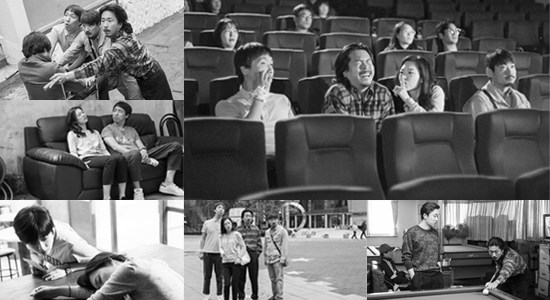
Written by Hayley Scanlon on 28 Mar 2017
Distributor N/A • Certificate N/A • Price N/A
A North Korean defector, a lonely orphan, and a nerdy landlord walk into a bar but also, perhaps, into a dream or several dreams in Zhang Lu’s latest chronicle of lovelorn city dwellers and their eccentric days of tiresome banality. Dreams, reality, and wish fulfilment mingle freely in this run down land of cheerful hopelessness populated by the displaced and permanently fugitive. Zhang’s film is as elusive as it is melancholy but offers its painful meditations with good humour and kindness even if it sees little possibility of escape.
Everyone is in love with a pretty barmaid, Yeri. Yeri bears this with good grace as she divides her attentions equally between her three suitors - nervous landlord Jong-bin, petty criminal Ik-june, and sorrowful North Korean defector Jung-bum. Having come to Korea as a teenager after her mother died, Yeri tracked down her estranged father only for him to suffer a serious illness requiring round the clock care soon after. When she’s not serving drinks or looking after dad, Yeri spends her time with the three guys, drinking, visiting the Korean Film Archive, or chatting with the romantic teenage poetess so obviously, painfully, in love with her that Yeri is able to do little other than ignore it in an attempt to let her down gently.
Dreamscape aside, the problems each of the protagonists is facing is real enough. Yeri’s life yields its own sorrows as her heartfelt rendition of Li Bai’s famous ode to homesickness makes plain, as do her frequent references to her mother and the quest for a mysterious crater-bound lake. Having lost a mother and found a father she loses again when he is taken ill and she is left to care for a man she barely knew in the most intimate of ways. Her burden is a heavy one and her dreams filled with the idea of abandoning it as her father’s wheelchair careers emptily down the hill on which they live. A visit to a fortune teller proves far from reassuring when he informs her that her father will live a long life, but abruptly changes the subject when it comes to a more personal projection.
The three guys could almost be aspects of her own personality turning up to haunt her but each of Yeri’s men (as she later describes them) is battling his own kind of despair. Jung-bum’s is the most pronounced as he battles bipolar disorder and possible PTSD from North Korean labour camps. A refugee with no one to protect him, Jung-bum falls victim to workplace exploitation only be fired because his eyes are “too sad” and it’s bringing his boss down. Ik-june, kinder than anyone gives him credit for, thinks he can help him through his gangland godfather “Mr. Jellyfish” but Ik-june can’t decide how far he really wants to be in the criminal underworld and is in disgrace after laughing at a funeral. Jong-bim lays claim to control over everything in sight as he’s “the landlord” only it’s his father who actually owns the land and Jong-bim is arrested in an almost adolescent sense of powerlessness.
Nevertheless, their days are ones of gentle dreaming as the guys push their luck but refuse to compete for the love of Yeri, preferring to share the unique light she seems to bring into their darkened world. Dreams and reality flow into one another without thought or warning leaving each indistinct as Yeri dances drunkenly on a rooftop only to turn around and find her trio of suitors disappeared, though the surreal characters which people the city including an old lady who collects cans, bottles and cardboard to place outside an old wardrobe on the side of the road which she uses “to pray” might make “reality” a difficult thing to believe in in any case.
Purgatorial as their existence is, the melancholy collective seem to find a comforting symbiosis in their personal miseries. Filming through mirrors and opaque curtains Zhang rejects any idea of certainty or concrete realities. The Chinese characters which accompany the film’s original title effectively mean “short lived illusion”, lending a poetic air to the otherwise surreal goings on, painting this greyed out land as a temporary container for eternal woes. At the film’s end we either wake up or fall asleep, or perhaps merely exchange one dream for another but despite all of the heartache and desperation this strange world is one defined by warmth and basic human goodness.
A Quiet Dream was screened as the first in a series of teaser screenings ahead of the main London Korean Film Festival to take place in November 2017. Tickets are already on sale for the next in the series, Missing, at Picturehouse Central, 10th April 6.30PM
posted by Richard Durrance on 19 Jan 2026
posted by Richard Durrance on 08 Jan 2026
posted by Richard Durrance on 17 Dec 2025
posted by Richard Durrance on 12 Dec 2025
posted by Ross Locksley on 09 Dec 2025
posted by Richard Durrance on 28 Nov 2025
posted by Richard Durrance on 25 Nov 2025
posted by Richard Durrance on 18 Nov 2025